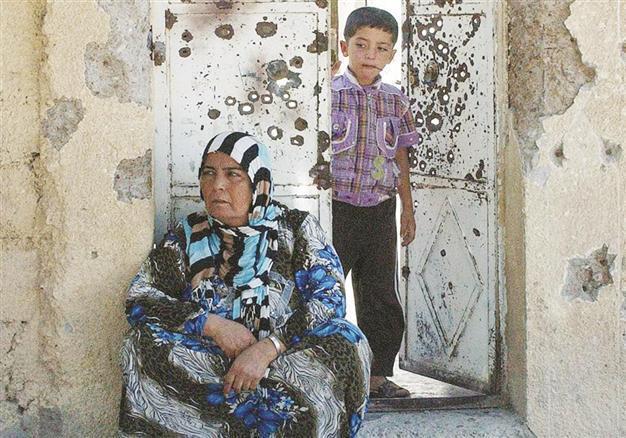Turkey not categorically against formation of autonomous Kurdish entity inside Syria
Emine KART ANKARA - Hürriyet Daily News

A woman sits at the entrance of her home in the Syrian town of Ras al-Ayn, close to the Turkish border, following clashes between al-Qaeda-linked al-Nusra insurgents and Kurdish militants which have raged in recent weeks. AFP photo
Turkey is not categorically against the formation of an autonomous Kurdish entity inside Syria as long as this decision is made at a Parliament representing the nation’s will, Turkish officials have said. For the moment, Turkey is against any kind of fait accompli regarding such a formation in an environment of chaos inside the neighboring country, the officials said after talks with Salih Muslim, the co-leader of the main Kurdish group in northern Syria, the Democratic Union Party (PYD).During the same meeting, Turkish officials responded positively to the PYD side’s requests for humanitarian aid to reach Rojava (the Kurdish name for the Syrian Kurdish enclaves in the northern part of the country), but no tangible result has been reported.
Muslim held a meeting with officials from the Foreign Ministry and the National Intelligence Service (MİT) Aug. 14, marking the second such meeting openly hosted in Turkey after the first one in late July. Particularly taking into consideration the once harsh rhetoric against the PYD by Ankara, a considerable number of analysts interpreted these meetings and the lack of secrecy of the past few meetings as a policy change rather than fine-tuning.
No autonomy sought
During talks with Turkish officials, Muslim reiterated that they are not seeking autonomy or independence, as he maintained that “their requests concerning the future will be pursued inside Syria and the decision concerning Syria’s future will be made together by all Syrians,” Turkish diplomatic sources told the semi-official Anadolu Agency late Aug. 14.
Yet, according to news reports posted from Qamishli in northern Syria only a few hours earlier on Aug. 14, the PYD’s other co-leader, Asia Abdulla, said they were in the second stage of declaring self-autonomy. Elections will be held once all parties involved are approved, Abdulla said.
“Her statements are not binding for me. Our counterpart is Muslim and likewise at the previous meeting, Muslim told us that what they have been demanding right now is not a demand for autonomy. They have been forming a local and non-permanent committee in order to provide for the needs of their people. This is something acceptable as long as they do not attempt to turn this non-permanent structure into a different body as a fait accompli,” a senior Turkish diplomat told the Hürriyet Daily News Aug. 15 when reminded of the contradiction between Muslim’s reported remarks and Abdulla’s reported prospects.
“Autonomy is a decision that shall be made by the free will of the people of Syria and when it is eventually made in a free Syria, then Turkey will have no problem with it,” the same diplomat, speaking under customary condition of anonymity, said, echoing remarks recently delivered by Foreign Minister Ahmet Davutoğlu.
Meanwhile, although the Turkish side pledged to continue humanitarian aid to Syrians without any sectarian or ethnic discrimination, there had been no concrete decision made to reopen the border gates so that aid collected by civilians could be transferred to Rojava, officials said.
















